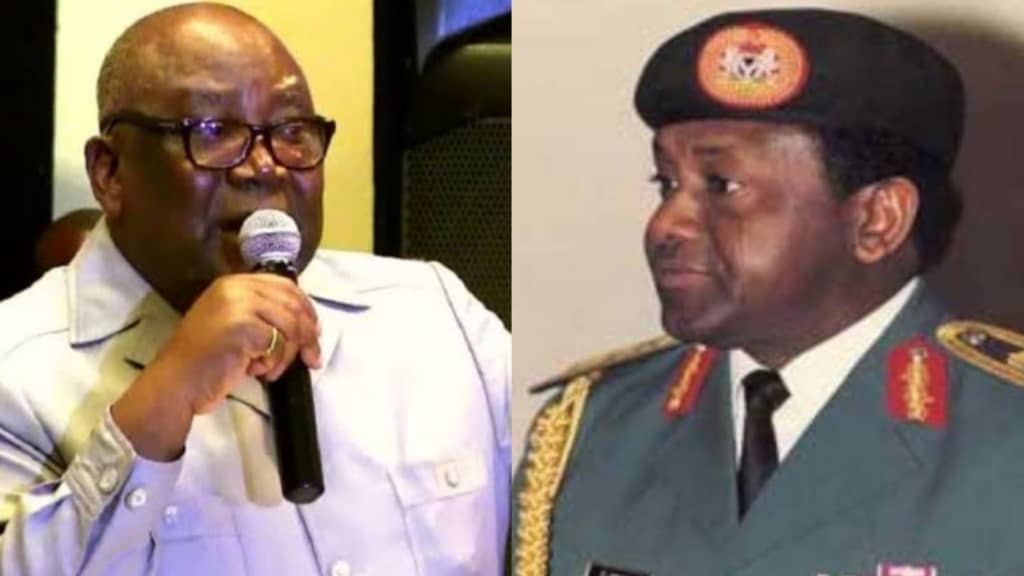Headlines
Bello-Fadile: Abacha Wouldn’t Have Taken Over if I Had Resumed as Sonekan’s ADC

Bello-Fadile claims that Abacha’s military takeover could have been prevented if he had been allowed to assume his role as ADC to Ernest Shonekan during Nigeria’s transitional period.
Babatunde Bello-Fadile, a retired Nigerian Army colonel, stated that if he had been permitted to serve as the aide-de-camp (ADC) to interim president Ernest Sonekan, the late General Sani Abacha would not have seized power from his government.
“I was assigned as ADC to Sonekan, but I never understood why I wasn’t permitted to start the role. Had I been in that position, it’s likely that the takeover wouldn’t have occurred,” Bello-Fadile remarked during Friday’s episode of Inside Sources with Laolu Akande, a socio-political program broadcasted on Channels Television.
“Why didn’t I resume? The Chief of Army Staff advised me to wait until Sonekan returned from Malta, where he attended the Commonwealth Heads of State meeting that year. So, I stayed around, and everything unfolded once he came back.”
Nigeria’s return to democracy was preceded by a tumultuous series of events. In 1993, the election results were annulled controversially after it was determined that MKO Abiola had emerged victorious. Following this, General Ibrahim Babangida, who had seized power in a 1985 coup against General Muhammadu Buhari, stepped down from his position. He established an interim government with businessman Ernest Shonekan as president and Sani Abacha serving as Chief of Defence Staff and Minister of Defence.
On November 18, 1993, just three months after taking office, Abacha executed a palace coup to overthrow Sonekan.
More than three decades later, Bello-Fadile contends that the circumstances surrounding Sonekan’s resignation were unusual.
Facing Abacha
The lawyer, who previously led the Legal Unit of the Nigerian Army, also reminisced about confronting Abacha following his takeover from Sonekan.
He stated that the military chose to withdraw after June 12, following which an interim government was established. It was agreed upon that they would facilitate the transition to an elected government.
“The civilians who were elected were permitted to remain, but my friend (Abacha) chose to refuse this.”
The second-in-command to Sonekan, Abacha, orchestrated a resignation and discarded the agreement that the military should transition towards establishing a democratic government.
Similar individuals in the military expressed that such an event could not occur. Subsequently, Abacha claimed that supporters of IBB were pushing for a return to democracy. Suddenly, he declared their retirement.
At that time, I was still serving in the military, and he retired all of my friends—17 of them. I’m not sure how I managed to get through it.
Then, Abacha established panels to evaluate all aspects. The Kayode Esho panel, which included me as a member, was tasked with reviewing the judiciary. I was the sole military representative among judges and lawyers on this panel. Subsequently, they initiated police reform efforts and commissioned a White Paper primarily as a stalling tactic.
After we submitted the White Paper Committee Report, he inquired about what feedback we were receiving. I informed him that the public was expressing a desire for the military to return to their barracks.
Decree 63, established by Babangida, appointed you as deputy with a provision that in the event of anything happening to the interim president, you would assume leadership. However, this transition meant maintaining your role as head of state and continuing with the existing cabinet; it did not entail disregarding or dismantling the decree. Instead, when you assumed control and drastically altered its course—which has led to discontent from the international community.
I didn’t intend to overthrow the government. Our goal was to reinstate an interim government. I was actively involved in advocating for this change, while General Olusegun Obasanjo was pursuing similar efforts through his National Unity Organisation of Nigeria, also urging the military to return to their barracks.
General Shehu Yar’Adua participated in the Constituent Assembly, which established a timeline for the military’s departure.
